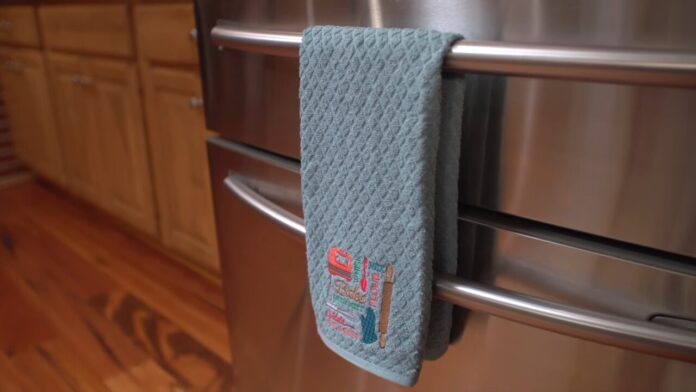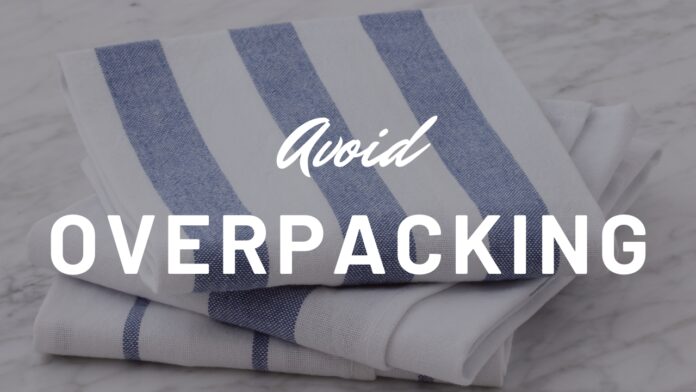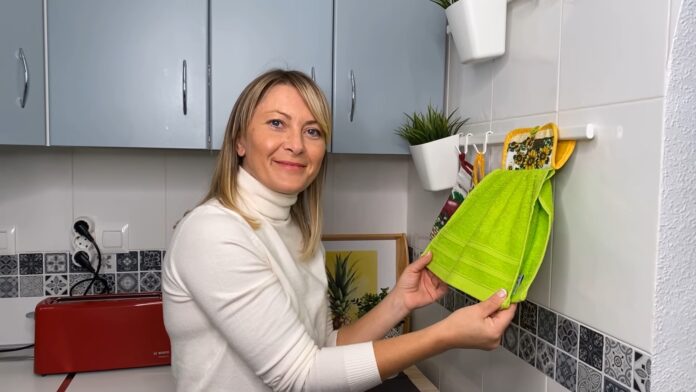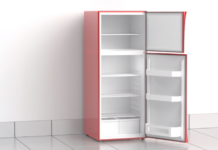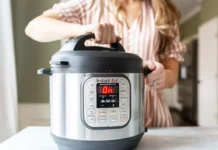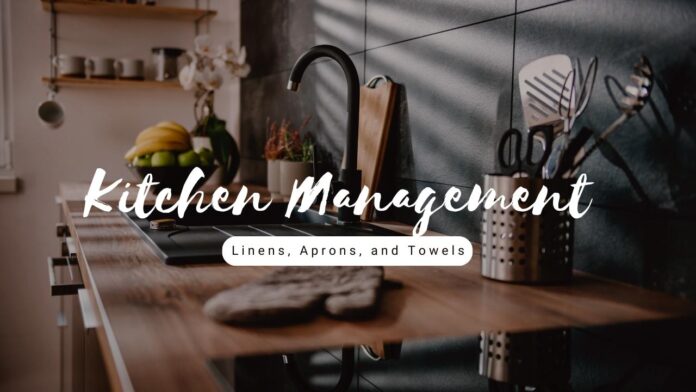
..Proper management of kitchen linens, aprons, and kitchen towels is essential for maintaining a clean, safe, and efficient kitchen environment. Some might say it is just a piece of cloth, but it plays a crucial role in kitchen operations. Linens, aprons, and towels ensure hygiene standards and safeguard the health of both staff and customers.
Hence, effective kitchen management not only contributes to the overall cleanliness of the kitchen but also enhances the reputation of the establishment.
Roles and Benefits of Linens, Aprons, and Kitchen Towels in Professional Kitchens
Kitchen linens, aprons, and towels act as barriers between food, surfaces, and kitchen staff, preventing cross-contamination. They help maintain a hygienic workspace, reducing the risk of foodborne illnesses and ensuring compliance with health regulations.
- Aprons – It serves as protective wear for kitchen staff. It shields staff from hot splatters, liquids, and potential injuries when they handle sharp utensils.
- Table napkins and towels – These are important in a culinary setting. It enhances the chef’s presentation of dishes when serving customers.
- Kitchen towels – It is used to handle hot pans, trays, or utensils. It is also used to dry washed dishes, hands, or produce.
Hygiene and Safety Considerations in Kitchen Management
Cross-contamination is a significant concern in the kitchen and can occur when bacteria or pathogens are transferred from one surface or item to another, potentially leading to foodborne illnesses. Proper handling of kitchen linens, aprons, and towels is essential to minimize cross-contamination risks.
You can prevent cross-contamination by:
- Implement a color-coded system for different types of towels and aprons, designating specific colors for specific areas or tasks. For instance, use different colors for cleaning surfaces, handling raw meat, and drying hands to prevent accidental mix-ups.
- Regularly replace or launder kitchen towels and aprons, especially after handling raw meat, spills, or potential contaminants.
- Ensure that each task has its dedicated set of towels or aprons, to avoid using the same ones for different purposes.
The correct handling and storage of kitchen linens and towels are vital to maintain their cleanliness and prevent contamination:
- Separate Storage: Store clean and soiled linens separately to prevent cross-contamination. Use designated areas or containers for each.
- Ventilation: Ensure that the storage area for clean linens is well-ventilated to prevent the growth of mold and mildew.
- Dry Environment: Keep the storage area dry, as moisture can promote bacterial growth and unpleasant odors.
- Proper Folding: Train staff on the proper folding techniques to minimize handling and contact with clean linens.
- Avoiding Contact: Instruct staff not to place clean linens on potentially contaminated surfaces, such as countertops or floors.
Regular cleaning and sanitization are crucial for maintaining the hygiene of kitchen linens, aprons, and towels. If you do not have an in-house laundry service, it is better to hire a commercial laundry like Laundry Luna to help you launder your linens and towels.
Laundry and Maintenance of Linens, Aprons, and Towels
It is always better to have a professional laundry service to help you maintain your linens, aprons, and towels. But, if your establishment does not have a budget, you can always learn and practice effective washing techniques.
- Separate kitchen linens, aprons, and towels based on their colors, fabric types, and level of soiling. Washing similar items together prevents color bleeding and ensures they receive the appropriate cleaning treatment.
- Before washing, treat stains promptly with stain removers or a mixture of water and detergent. Gently rub the stain to avoid damaging the fabric.
- Wash kitchen linens and towels in hot water whenever possible, as the higher temperature helps kill bacteria and remove grease effectively. Follow the care instructions on the garment’s label to determine the appropriate water temperature for specific materials.
- Use a gentle cycle, especially for delicate materials like linen or aprons with decorative elements, to prevent damage during the wash cycle. Avoid overloading the washing machine, as it can hinder proper agitation and cleaning. Smaller loads allow better cleaning and rinsing.
- Avoid over-drying kitchen linens, as it can cause fabric shrinkage and increase wear. Remove linens from the dryer promptly once they are dry or slightly damp, and hang or fold them to finish drying.
For tough stains, pre-treat the affected area with a stain remover or a mixture of water and detergent before washing. Consider using specialized stain removers for specific stains, such as grease or wine.
Discover the top-rated products to easily cut through grease in your kitchen with our carefully curated list of 15 best kitchen degreasers for 2023.
Kitchen towels and cleaning cloths have a limited lifespan due to wear and tear, and they can become less effective over time. So, regularly inspect the linens, aprons, and towels.
8 Storage Tips for Linens, Aprons, and Towels
Proper storage of kitchen linens, aprons, and towels is not only essential for maintaining their appearance but also for ensuring their longevity and hygiene. Here are some tips to help you store these items effectively:
1. Ensure Complete Dryness
Before storing, make sure all items are completely dry. Storing damp linens can lead to mold and mildew growth. If you’ve just washed them, air dry or tumble dry them thoroughly.
2. Ventilated Storage
Store your linens, aprons, and towels in a cool, dry place with good ventilation. Avoid storing them in damp areas like basements or closed cabinets without airflow.
3. Fold Neatly
Neatly folded items not only save space but also prevent creases and wrinkles. For towels, fold them in thirds lengthwise and then in half or thirds again, depending on their size.
4. Avoid Overpacking
While it might be tempting to cram as many items as possible into a drawer or shelf, overpacking can trap moisture and reduce air circulation, leading to mold growth.
5. Use Natural Sachets
Consider placing sachets filled with dried lavender or cedarwood in your storage areas. These natural scents act as repellents for pests and also give your linens a pleasant aroma.
6. Rotate Regularly
If you have multiple sets of linens or towels, rotate their use. This ensures even wear and tear and allows each set to breathe between uses.
7. Avoid Direct Sunlight
While it’s essential to store in a well-ventilated area, avoid places with direct sunlight. Prolonged exposure to sunlight can fade the colors of your linens and towels.
8. Store Special Linens Separately
If you have special occasion linens or heirloom pieces, store them separately, preferably wrapped in acid-free tissue paper. This protects them from dust, light, and potential damage from everyday items.
By following these storage tips, you can ensure that your kitchen linens, aprons, and towels remain fresh, mold-free, and ready for use whenever you need them.
Final Takeaway
Kitchen linens, aprons, and towels play vital roles in maintaining a clean, safe, and efficient kitchen environment. A well-managed linen system contributes not only to a clean and hygienic kitchen.
The clean and well-maintained aprons, towels, and linens contribute to a professional appearance, enhancing the overall image of the establishment.
Discover the comprehensive list of essential items that make up a fully equipped kitchen.

